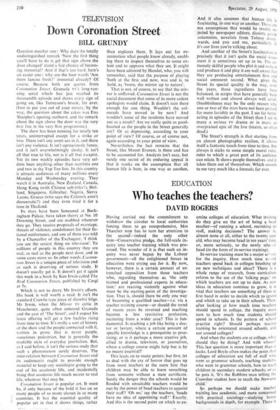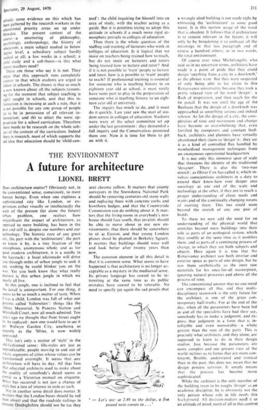EDUCATION
Who teaches the teachers?
DAVID ROGERS
Having carried out the commitment to withdraw the circular to local authorities forcing them to go comprehensive, Mrs Thatcher now has to turn her attention to the second—indeed the only other firm—Conservative pledge, the full-scale in quiry into teacher training which was pro- mised. The wonder of it is that such an in- quiry was never begun by the Labour government—all the enlightened forces in education were crying out for it. By now, however, there is a certain amount of en- trenched opposition from those teachers who, regarding themselves as 'the only trained and professional experts in educa- tion,' are reacting violently against what must be the starting-point of the investiga- tion. That is, should there be only one way of becoming a qualified teacher—i.e. via a teacher training course—or should the trend of recent years be reversed and teaching become a less restrictive profession, recruiting from a wider area? This is fun- damental. Is teaching a job like being a doc- tor or lawyer, where a certain amount of specific knowledge is a prerequisite to prac- tising; or is it perhaps a more creative job, allied to drama, television, or journalism, where a college course might help but is by no means essential?
This leads on to many points; but first, let us deal with the cry of horror that goes up from most teachers at the mere hint that children may be able to learn something from someone without a state certificate. Surely the danger that the schools would be flooded with unsuitable teachers would be met by the power of head teachers to appoint their staff? 'Oh no,' say the teachers, 'heads have no idea of appointing staff!' Exactly. And this is the second point on which to ex- amine colleges of education. What training do they give on the art of being a head teacher—of running a school, recruiting its staff, making decisions? The answer is, almost none at all, either to the twenty year old, who may become head in ten years' time, or, more seriously, to the newly seloted head (in the form of in-service training).
In-service training must be a major Sliblea for the inquiry. How much time should teachers spend _back in colleges brushing up on new techniques and ideas? There is a whole range of research, from curriculum reform to the use of the 'talking page,' on which teachers are not up to date. As new ideas in education continue to grow, it is vital that teachers see something of them at first hand in order to decide which to ignore and which to take up in their schools. Then, after looking at how much time teachers should spend in college, the inquiry must turn to how much time students should spend in schools. Is the pattern of school practice right? Should perhaps teacher training be orientated around schools, and not around colleges?
And when the students are at college, what should they be doing? And with whom? This last question is more important than it looks. Lord Boyle often makes the point that colleges of education are full of staff who went to grammar schools, teaching students who went to grammar schools, how to teach children in secondary modern schools; or as he puts it, 'It's the Robbins-man telling the Crowther student how to teach the Newsom child.'
So perhaps we should make teacher training less academic, and more concerned with practical sociology—studying home backgrounds in depth, for example. There Is already some evidence on this which has been gathered by the research workers in the educational priority areas set up under plowden. The present content of the course—a smattering of philosophy, psychology, anthropology, the history of education; a main subject studied to below degree level, a subsidiary subject hardly studied at all; a few weeks in a school; a child study and a sub-thesis—is this what future teachers need?
There are those who say it is not. They areue that this approach runs completely counter to that which students are urged to follow in schools. The theory is that so much is now known about all the subjects (assum- ing for the moment that subject teaching is right) taught in schools, and that this in- formation is increasing at such a rate, that it is not possible for any one group of people (a) to be in possession of all relevant in- formation; and (b) to select the most ap- propriate for a school curriculum. Therefore there needs to be research on the whole sub- ject of the content of the curriculum. Indeed there is research, most of which supports the old idea that education should be `child-cen- tred': the child inquiring for himself into an area of study, with the teacher acting as a guide. But it is pointless trying to adopt this attitude in schools if a much more rigid at- mosphere prevails in colleges of education.
Then there is the whole question of the staffing and training of lecturers who work in *colleges of education. Is it logical that we insist on teachers being trained how to teach, but do not insist on lecturers and tutors being trained how to lecture and tutor? And if it is not possible to 'train' people to lecture and tutor, how is it possible to 'train' people to teach? If professional training is essential for someone who is teaching history to an eighteen year old at school, it must surely have some part to play in the preparation of someone who is teaching history to an eigh- teen year old at university.
The inquiry has much to do, and it must do it quickly. Last year saw the start of stu- dent unrest in colleges of education. Students were wary of the select committee set _up under the last government : they demanded a full inquiry and the Conservatives promised them one. Now it is time for them to get on with it.































 Previous page
Previous page